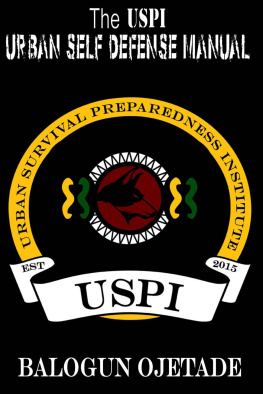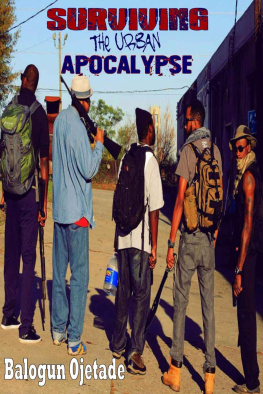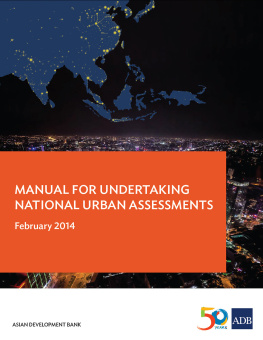Balogun Ojetade - The USPI Urban Self Defense Manual
Here you can read online Balogun Ojetade - The USPI Urban Self Defense Manual full text of the book (entire story) in english for free. Download pdf and epub, get meaning, cover and reviews about this ebook. year: 2016, publisher: CreateSpace Independent Publishing Platform, genre: Home and family. Description of the work, (preface) as well as reviews are available. Best literature library LitArk.com created for fans of good reading and offers a wide selection of genres:
Romance novel
Science fiction
Adventure
Detective
Science
History
Home and family
Prose
Art
Politics
Computer
Non-fiction
Religion
Business
Children
Humor
Choose a favorite category and find really read worthwhile books. Enjoy immersion in the world of imagination, feel the emotions of the characters or learn something new for yourself, make an fascinating discovery.
- Book:The USPI Urban Self Defense Manual
- Author:
- Publisher:CreateSpace Independent Publishing Platform
- Genre:
- Year:2016
- Rating:4 / 5
- Favourites:Add to favourites
- Your mark:
- 80
- 1
- 2
- 3
- 4
- 5
The USPI Urban Self Defense Manual: summary, description and annotation
We offer to read an annotation, description, summary or preface (depends on what the author of the book "The USPI Urban Self Defense Manual" wrote himself). If you haven't found the necessary information about the book — write in the comments, we will try to find it.
The USPI Urban Self Defense Manual — read online for free the complete book (whole text) full work
Below is the text of the book, divided by pages. System saving the place of the last page read, allows you to conveniently read the book "The USPI Urban Self Defense Manual" online for free, without having to search again every time where you left off. Put a bookmark, and you can go to the page where you finished reading at any time.
Font size:
Interval:
Bookmark:
surviving natural disasters
Natural disasters can occur at any time and any place. Technology provides some advance warnings of disasters such as hurricanes, tsunamis, brush fires and volcanic eruptions but with or without foreknowledge, you will only have two choices: to either evacuate and head for safety, or dig in and shelter in place. Your best chance of surviving any natural or manmade disaster is to spend a little time and money to prepare a plan, and gather some equipment and supplies.
Preparing For A Disaster
Contact your local emergency management, civil defense office, or Red Cross chapter to find out what types of disasters are most likely to occur in your area. They will be able to provide you with information on how to prepare for each.
Find out if your community has emergency warning signals, what they sound like, and what you should do when you hear them.
If you have children attending local schools, find out about the disaster plans at your childrens school or daycare center.
Make sure every family or group member has each others contact information including telephone numbers for home, work and cell phones and e-mail addresses. Post a copy of these contact numbers somewhere in the home that even the children can find, but not where intruders in your home can readily recognize. Do NOT put your family members or comrades phone numbers and email addresses on the refrigerator. Intruders will look their first for valuable information on you and your cadre.
Learn the location of your homes main electric fuse box, water service main, and natural gas main. Learn how to turn these utilities off and keep an adjustable wrench nearby in case the valves are rusted or stuck.
Inspect your home for other potential hazards. Look for objects that could fall or tip over during an accident and which could cause injuries or block exits. Heavy objects such as bookshelves, dressers, and hot water heaters may need extra support or restraining straps.
During a disaster, it is important that you work with a team to increase your chances of survival. Once you have organized your home and family disaster plan, make contact with your neighbors and/or your comrades to plan how the neighborhood/cadre can work together before, during and after a disaster.
If you already belong to a neighborhood organization, such as a home association or neighborhood watch group, introduce the subject of disaster preparedness at the next meeting
Pool your talents and learn what special skills your neighbors, friends and comrades have, such as medical, technical, or emergency responder expertise. Work together to plan how to help neighbors who have special needs, such as the disabled and elderly people. Also, designate who will supervise childcare in case parents cannot get home.
Purchase and store an ABC-type fire extinguisher and instruct each family member how to use it. Be sure to test and recharge your fire extinguisher(s) according to the manufacturers instructions.
Teach children how and when to call 911, or your local Emergency Medical Services number, for emergency help. Show each family member how and when to turn off the water, gas and electricity at the main switches.
A few simple preparations can go a long way to increasing your chances of surviving any emergency. As with all survival situations, information, knowledge and skills are more important than tools, equipment, and supplies.
Investing the relatively modest time and effort it takes to participate in first aid courses, urban and wilderness survival weekends, and self-defense classes will pay huge dividends in increased confidence, leadership ability, and survival savvy. At the least, you should keep a first aid/home treatment manual, a wilderness survival manual, and a Farmers Almanac in your home.
If you do not have a plan, your chances of survival drop. Have a family meeting and discuss why you need to prepare for disaster. Explain the possible threats unique to your environment such as wild fires, severe weather, earthquakes, floods, and the like. Discuss the types of disasters that are most likely to happen and outline a plan of action for each scenario. Plan how you will round up any young children and how you will take care of your pets.
Determine the best escape routes from your home. Plan to share responsibilities and designate specific responsibilities to each member. For example, one person will be put in charge of collecting food and water, another, the one with the most medical experience, will be in charge of monitoring medical supplies and treating injuries.
Put someone in charge of communications to ensure that everyone is accounted for, knows what the next stage in the plan is, and that outside family members and cadre are alerted to the situation. If you have school age children, designate who is in charge of picking them up.
If there are elderly or disabled people in your group, plan to secure their specific needs during a disaster. This could include special transportation, additional medicine or medical equipment, and extra assisted care. If you have pets, designate someone to ensure they have shelter, and a supply of food and water available.
Ask an out-of-state friend or family member to be your family contact. After a disaster, it is often easier to call long distance than locally. This person would act as a Call Center where other family members who have been separated could call this person and tell them where they are, their condition, and what help they need or can offer. Make sure everyone knows this contacts phone number and address.
Rendezvous And Fallback Locations
When a disaster strikes, you and your family may be in different locations, with children at school, adults at their jobs and seniors in the home. For this reason, it is important to meet with your family and decide on two places to meet in case an emergency prevents you from returning home.
Rendezvous: The Rendezvous location should be close to your home and is used in emergencies that prevent you from entering your home, such as fire, a gas leak, or a crime scene investigation. Choose a place, such as the corner convenience store, or a neighbors home, that can also provide relative safety and access to communications, food and water.
Fallback: The Fallback location should be outside your neighborhood and is used if you cannot return to the area because of wild fires, floods, landslides, earthquakes, or mob chaos. A close relatives home in a nearby town would be an ideal destination. Other possibilities could include a favorite hotel, resort, all night diner, cottage, or camping site. Make sure everyone in the family has a personal copy of the rendezvous and fallback addresses and phone numbers.
Bug-In Bag
The first question in a natural disaster is whether to stay or go. You need to make some simple preparations that would allow you to survive either decision. If your best choice is to stay in your home, then a few supplies set aside can ease the hardships.
A Bug-In Bag should provide the tools and necessities to allow you and your family to stay safe and sheltered in your home in the event that an emergency cuts you off from outside aid. It should contain food, water, and medicinal needs for everyone in your home for a minimum of three days. Supplies to include in the kit are as follows:
- Clothing
Keep one full change of clothing in the bag. These should be a rugged long sleeve shirt and long pants, which offers the most protection. Choose thicker clothing if you live in colder climates.
Also essential is an extra pair of comfortable walking shoes or boots.
A pair of work gloves can come in handy when having to clean up broken glass and clear rubbish or doing emergency repairs.
Font size:
Interval:
Bookmark:
Similar books «The USPI Urban Self Defense Manual»
Look at similar books to The USPI Urban Self Defense Manual. We have selected literature similar in name and meaning in the hope of providing readers with more options to find new, interesting, not yet read works.
Discussion, reviews of the book The USPI Urban Self Defense Manual and just readers' own opinions. Leave your comments, write what you think about the work, its meaning or the main characters. Specify what exactly you liked and what you didn't like, and why you think so.










